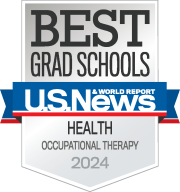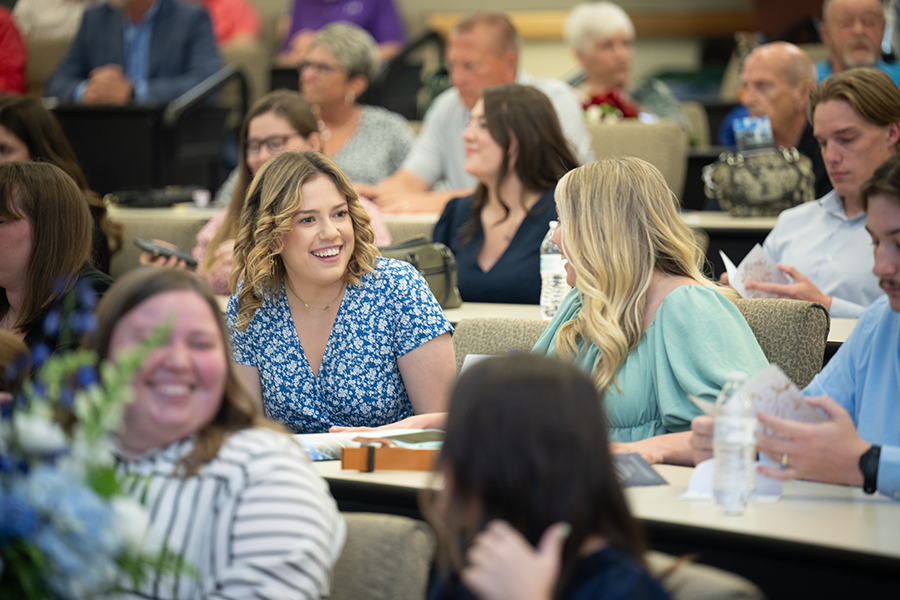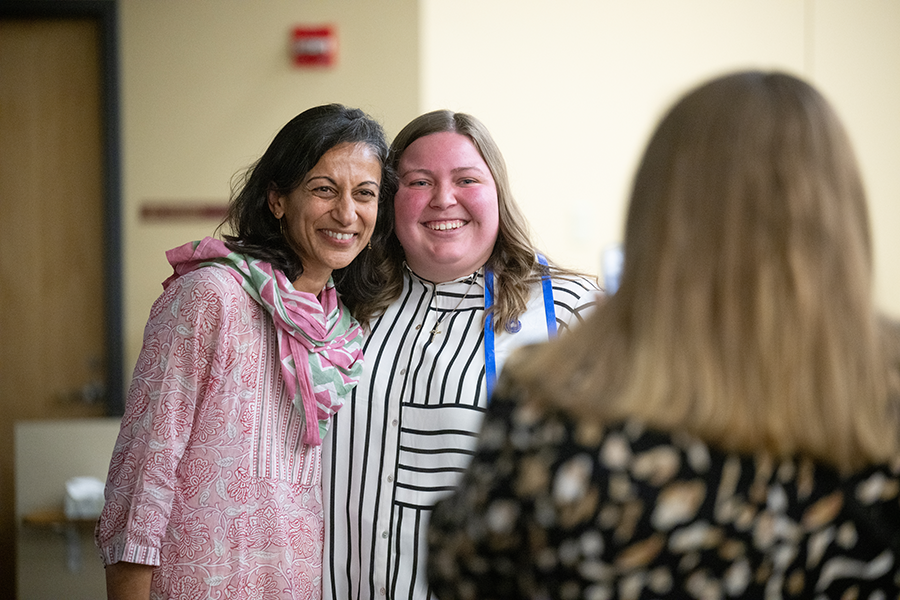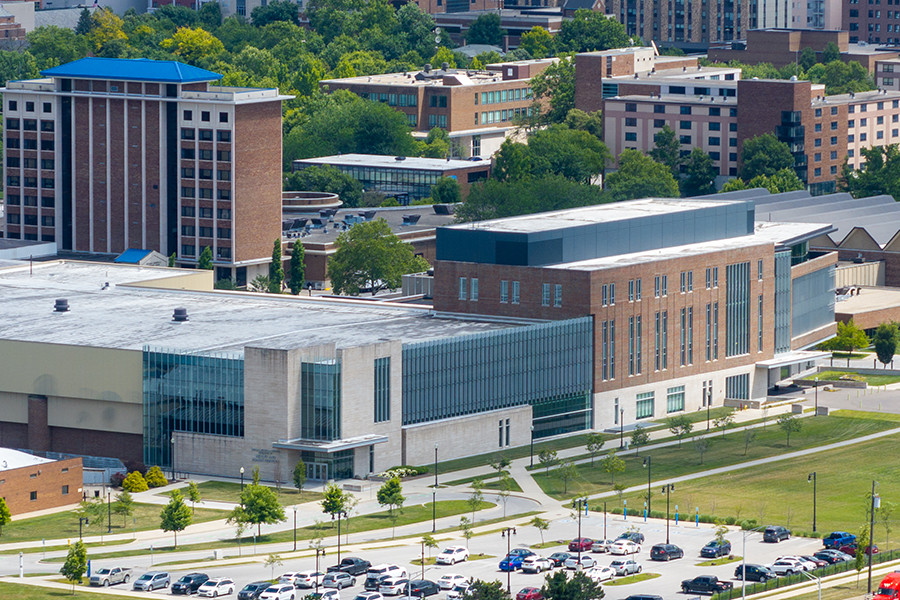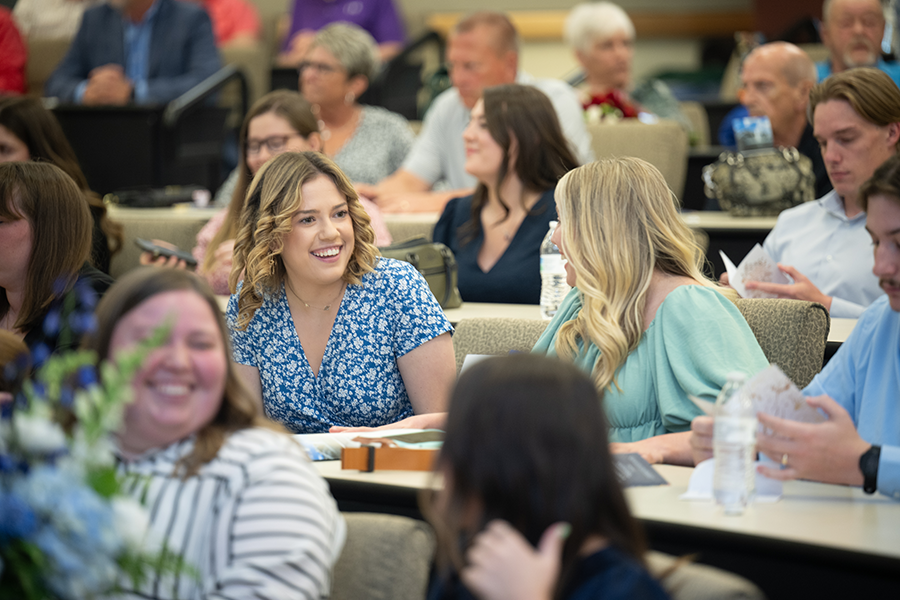Program Availability
The Master of Science in Occupational Therapy is a traditional, on-campus program offered on the Indiana State University campus in Terre Haute, Indiana. The program is designed for individuals who hold a bachelor’s degree from an accredited U.S. college or university in any field other than occupational therapy. There is no specific undergraduate major required.
This program is open to eligible U.S. and international applicants who have received a bachelor’s degree and completed prerequisite courses from an accredited U.S. institution. Admission is competitive.
See Admission Requirements further down this page for additional eligibility information.
Why Earn a Master’s in Occupational Therapy at Indiana State?
Our MSOT program prepares you to succeed as a highly skilled Occupational Therapist (OT) who demonstrates excellence in patient practice, professionalism in the therapeutic environment, and professional responsibility as a member of the OT profession.
The Occupational Therapy MS degree can be completed in two years of full-time study. We accept students into a cohort once per year, beginning with the first summer term (May).
Upon successful completion of program requirements, you will be prepared and eligible to take the National Board for Certification in Occupational Therapy (NBCOT) Examination.
Affordable Excellence
Indiana State’s Master of Occupational Therapy is one of the nation’s most affordable MSOT programs. Our graduates post exceptional board pass rates and are highly recruited upon graduation. MSOT students at Indiana State enjoy extensive opportunities to participate in community engagement and simulation center experiences, which are hallmarks of this ACOTE-accredited program.
As an MSOT student, you will gain hands-on clinical and research experience in state-of-the-art labs and facilities, including our Activities of Daily Living (ADL) Laboratory, the Applied Medicine Research Center, Occupational Therapy Pediatrics Laboratory, Occupational Therapy Classrooms, and the Rural Health Innovation Collaborative (RHIC) Simulation Center.
Preparation for Success
Indiana State’s Master of Occupational Therapy (MSOT) program prepares you to become a successful occupational therapist with the knowledge and skills needed to screen, evaluate, and provide appropriate interventions for all levels of physical, sensory or cognitive impairments in clients across the lifespan.
Your program of study will include classroom lectures and discussions, theory, laboratory study, simulation center experiences, and clinical education, during which you will gain supervised experience in community-based and traditional settings. And you will work with members of the community early in your studies.
The Occupational Therapy MS program is designed around themes of Interprofessional Education, Professional Responsibility, and Excellence in Practice. Our objective is to prepare occupational therapists who are highly skilled healthcare providers, consultants, educators, managers, researchers, and advocates for the profession and the consumer. Our program also seeks to improve patient access and quality care for rural and underserved populations through interprofessional education.
Extensive Fieldwork Education
The MSOT’s fieldwork education component is a key element in ensuring your success post-graduation. Your fieldwork experiences will enable you to apply classroom knowledge to patients in the clinical setting. You will engage in four clinical experiences.
- In Year One, you will complete two Level I fieldwork experiences, in both traditional and community-based settings, to practice beginning skills learned during your first year.
- In the summer after Year One, you will complete your first 12-week Level II fieldwork experience that focuses on entry-level clinical skills.
- During your final Spring semester, you will complete your second 12-week Level II fieldwork experience that focuses on entry-level clinical skills in a different practice area.
Your fieldwork experiences will take place in different clinical practice settings to ensure your development as a well-rounded generalist clinician. We encourage you to complete at least one of your clinical experiences in a rural or underserved area. All experiences are not guaranteed to take place within the geographical area surrounding Indiana State University’s campus.
All fieldwork requirements must be completed within one year of completion of Didactic coursework.
Learn from Our Excellent Faculty
As a student in the Occupational Therapy program, you will benefit from small classes taught by dedicated faculty mentors who are known for their many years of diverse clinical experience. They are committed to your educational success, professional development, and intellectual growth.
Our award-winning faculty include a Certified Hand Therapist (CHT) and a certified Sensory Integration Assessment and Intervention Specialist. Faculty recently recognized for excellence in teaching, research, and community engagement include:
- Associate Professor of Applied Medicine and Rehabilitation Priya Bakshi, OTD, OTR, CHT, who received the Outstanding Scholarship Level Two Award from the College of Health & Human Services
- Instructor of Applied Medicine and Rehabilitation Sandra Durham, MA, OTR/L, who received the Lecturer Achievement Award, presented by the College of Health & Human Services
- Assistant Professor of Applied Medicine and Rehabilitation Meghan Steward, OTR/L, who received the Outstanding Community Engagement Level II Award, presented by the College of Health & Human Services at Indiana State University.
What You’ll Learn in the Occupational Therapy Program
Indiana State’s Master of Science in Occupational Therapy is a full-time program that includes 69 post-baccalaureate graduate credits. The MSOT program can be completed over six consecutive semesters beginning in late May.
Core clinical hours are spent with occupational therapy fieldwork educators providing supervised client care for a total of 14 credits. The didactic and theory credits include laboratory time, service learning, and practice hours using patient simulation.
In the MSOT program, you will learn with and about other healthcare students, including those studying to become physician assistants, physical therapists, speech therapists, nurses, respiratory therapists, athletic trainers, and social workers. This will help you develop an understanding of each healthcare professional's role and expertise, and it will promote the teamwork and communication skills needed to enhance patient care.
Educational Outcomes
Your objectives in the Occupational Therapy MS program are as follows:
- Utilize critical thinking with knowledge derived from the biological, behavioral, and clinical sciences for clinical decision-making.
- Demonstrate ethical behavior consistent with professional and legal standards.
- Provide guidance and interventions to enhance or enable participation in roles in home, school, workplace, and community settings, and to promote wellness.
- Provide safe and effective standards of care for a diverse client population.
- Communicate effectively with clients, families, colleagues, other healthcare workers, and the general public orally and in writing.
- Plan and execute research, disseminate research findings, and critically evaluate the professional literature to promote evidence-based practice.
- Demonstrate continuing personal and professional growth to maintain professional competence, advance career development, and contribute to the development of the profession.
- Analyze trends in health care and advocate for community-based initiatives related to health and well-being.
Essential Functions
The MSOT program provides an Essential Functions document that details the basic functions required for successful completion of an occupational therapy program (didactic and fieldwork components). Applicants and students who are unable to complete these functions are encouraged to contact the Accessibility Resource Office at Indiana State University.
Sample Program of Study
Indiana State University Occupational Therapy Masters (MSOT) Program Study Class of 2027 | ||
Year 1 | ||
Summer Session | Fall Semester | Spring Semester |
Number - Course title - (Credits) | Number - Course title - (Credits) | Number - Course title - (Credits) |
OCTH 600 Introduction to OT (1) | *OCTH 601 Functional Human Anatomy (4) | *OCTH 625 Work & Industry (2) |
OCTH 602 Documentation in OT (1) | *OCTH 612 Human Movement and Occupational Performance (4) | *OCTH 731 Adults & Aging (4) |
OCTH 611 OT Process and Theory (3) | *OCTH 624 OT Rehab (4) | *OCTH 741 OT w/Children & Youth (4) |
OCTH 606 Applied Neuroscience (3) | *OCTH 622 Client Care Skills (2) | *OCTH 740 Psychosocial Evaluation and Intervention (3) |
OCTH 604 Evidence-Based Practice in OT (3) | OCTH 770 Level I Fieldwork A (1) | *OCTH 623 Assistive Technology (2) |
|
| OCTH 771 Level I Fieldwork B (1) |
Term Total 11 | Term Total 15 | Term Total 16 |
| Running Total 26
| Running Total 42 |
Year 2 | ||
Summer Session | Fall Semester | Spring Semester |
Number - Course title - (Credits) | Number - Course title - (Credits)
| Number - Course title - (Credits)
|
OCTH 773 Level II Fieldwork A (6) | *OCTH 751 Management & Leadership (2) | OCTH 774 Level II Fieldwork B |
| *OCTH 744 OT w/Children & Youth II (3) | OCTH 776 Fieldwork Seminar (1) |
| *OCTH 752 Adv UE Conditions (4) | OCTH 777 Professional Development Seminar (2) |
| *OCTH750 Reasoning & Complex Clients (3) |
|
Term Total 6 |
Term Total 12 | Term Total 9 |
Running Total 48 | Running Total 60 | Running Total 69 |
Program Outcomes
Graduates of this program will be eligible to sit for the National Certification Examination for the Occupational Therapist, administered by the National Board for Certification in Occupational Therapy (NBCOT®). After successful completion of this exam, the graduate will be an Occupational Therapist, Registered (OTR). In addition, all states require licensure to practice; however, state licenses are usually based on the results of the NBCOT Certification Examination. A felony conviction may affect a graduate’s ability to sit for the NBCOT Certification Examination or attain state licensure.
The following are Indiana State’s graduation rates since 2018 and our NBCOT Certification Examination performance rates since 2021.
Graduation Rates
| Graduation Year | Graduation Rate |
|---|---|
| 2022 | 100% |
| 2023 | 100% |
| 2024 | 100% |
| 2025 | 100% |
| TOTAL | 100% |
NBCOT Certification Exam Performance Rates
| Year | NBCOT National Certification Exam Pass Rate |
|---|---|
| 2022 | 100% |
| 2023 | 100% |
| 2024 | 100% |
| TOTAL | 100% |
Costs and Aid
The following are estimated MSOT program costs, including tuition and fees. These are based on the 2024-25 academic year. The University Board of Trustees reserves the right to change fees at any time in the future. The right to correct errors is also reserved.
2026-2027 Graduate Tuition Rates
| Student Type | Tuition (cost per credit hour) | Number of credit hours | Total Tuition Cost Six Semesters |
|---|---|---|---|
| Indiana Resident | $462 | 69 | $31,878 |
| Out-of-State Student | $909 | 69 | $62,721 |
2026-2027 Graduate and Program Fees
| Fee Type | Fee Amount |
Detail
|
Total for Six Semesters |
|---|---|---|---|
| Seat Fee | $500 | Due upon acceptance into program. |
$500 |
| Program Fee | $9,000 | $1,500 due each semester. | $9,000 |
| Student Health & Wellness Fee | $40 each Fall/Spring $20 Summer semester | $200 | |
| Recreation Center Fee | $100 per semester | $600 | |
| Textbook Cost | $1,500 | Estimate. Actual costs may vary. | $1,500 |
Criminal Background Check | $60 | $60 | |
Lodging & Travel Expenses for Fieldwork | No estimate available. | Costs dependent on the Fieldwork Placement location and cannot be fairly estimated.
|
No estimate available. |
| Terre Haute Estimated Cost of Living | $22,032 for two years | $11,016 per year as estimated by the Financial Aid Office | $22,032 |
2026-2027 Total Estimated Costs
| Student Type |
Total Estimated Tuition Cost
|
Total Estimated Fees and Other Costs | Total Estimated Costs (does not include additional living expenses during Fieldwork Level II) |
|---|---|---|---|
| Indiana Resident | $31,878 | $11,860 | $43,738 |
| Out-of-State Student | $62,721 | $11,860 | $74,581 |
The University’s Office of Student Financial Aid provides additional information regarding tuition and financial aid for graduate students.
Policies and Procedures
The Occupational Therapy MS program maintains detailed policies and procedures regarding withdrawals and refunds, student grievances, equipment usage, health and safety protocols, and other important matters. You may review these policies and procedures in the OT Student Handbook.
Career Possibilities for Occupational Therapy Graduates
Occupational therapists practice in hospitals, outpatient clinics, schools, workplaces, and nursing homes, among other settings. They play an important role in preventive care, rehabilitation, and treatment for patients of all ages who have chronic conditions, illnesses, and injuries.
Because the need is so great, the career outlook for Occupational Therapists is strong and salaries are excellent. U.S. News & World Report lists Occupational Therapist as the #4 "best job" in health care and #19 overall, based on the number and increased percentage of projected openings from 2022 to 2032 as determined by the U.S. Bureau of Labor Statistics.
Preparing To Improve Others’ Lives Through OT
Occupational Therapists help people of all ages improve their ability to perform everyday activities and tasks. The goal of the Occupational Therapy MS program at Indiana State University is to prepare students to enhance their patients’ quality of life and independence, particularly in the context of physical, cognitive, or emotional challenges. In this video, hear from students and faculty in the MSOT program.
The Occupational Therapy program is accredited by the Accreditation Council for Occupational Therapy Education (ACOTE) of the American Occupational Therapy Association (AOTA), located at 7501 Wisconsin Avenue, Suite 510E, Bethesda, MD 20814. ACOTE’s telephone number, c/o AOTA, is 301-652-6611. acoteonline.org

Admission Information and Deadlines
The Master of Science in Occupational Therapy (MSOT) program at Indiana State University participates in the Occupational Therapist Centralized Application Service, known as OTCAS. All applicants to the MSOT program must apply and submit all application materials using the online OTCAS application. For details and instructions, visit the OTCAS website at otcas.liaisoncas.com.
The MSOT program accepts students into a cohort once per year, beginning with the first summer term (May). The rolling admissions cycle runs from mid-July to April of each year. Applications must be in VERIFIED status by OTCAS to be considered. (Please note that the verification process can take 3 – 4 weeks from the time the application is submitted.)
The MSOT application process through OTCAS for 2026-27 will be open from July 2025 through April 2026. Applicants for the Summer 2026 program, graduating in May 2028, must be in VERIFIED status by OTCAS by April 24, 2026, to be considered.
Applicant interviews are conducted throughout the year, with decisions made shortly following the completion of interviews. The interview day consists of a 15-minute interview with members of the MSOT program and alumni, along with optional tours of the Indiana State campus and other facilities that will be used by MSOT students.
To schedule a personal tour, please email our Admissions Office at ISU-OT2@indstate.edu.
Learn more about MSOT admission guidelines, prerequisites, and eligibility.
Admission Requirements
Applicants must hold a baccalaureate degree granted by a regionally accredited U.S. institution in any area except occupational therapy, with a preferred minimum cumulative and prerequisite grade point average (GPA) of 3.0 on a 4.0 scale. The baccalaureate degree must be earned before enrolling in the program. Coursework must have been completed within seven (7) years of the date of application.
Applicants must have completed prerequisite coursework (listed below) with a preferred minimum GPA of 3.0.
Applicants must provide recommendations from a licensed occupational therapist, an academic source, and one other licensed rehabilitation professional. (Guidelines are listed in the OTCAS.)
Applicants are required to complete the Occupational Therapy Observation/Experience requirement, which consists of a minimum of 20 hours of volunteer/observation experience or paid work under the supervision of a licensed occupational therapist. These experiences should include one practice setting; multiple sites are encouraged.
Applicants are encouraged to have their OT observation hours verified electronically through OTCAS at the time that they apply, rather than using a paper form. However, paper forms uploaded as attachments to the OTCAS application are also accepted.
International students must have completed a bachelor’s degree and prerequisite courses from a regionally accredited U.S. college or university. The Test of English as a Foreign Language may be required.
An up-to-date resume must be uploaded to OTCAS.
The form must be completed for coursework if there is question as to whether your courses cover required pre-req content. Email form to ISU-OT2@indstate.edu
Applicants are required to complete the interview. Interviews are by invitation only. The program reserves the right to offer virtual interviews as needed.
Applicants who plan, upon graduation, certification, and licensure, to provide occupational therapy services to an underserved population in Indiana, may receive additional points towards the applicant selection process. Obtain a letter on official letterhead from an institution located in a medically underserved area. The letter must endorse the applicant and indicate plans for the applicant to provide future services.
Prerequisite Courses
The following undergraduate courses or their equivalents must have been completed with a minimum 3.0 grade point average to be eligible for admission to the Occupational Therapy MS program.
One course in Human Anatomy, or the first course in the series of Anatomy and Physiology I & II. Anatomy content should include the skeletal and muscular systems of the human body. The equivalent of Indiana State’s BIO 231 and Lab or ATTR 210 and Lab. (Exception for ATTR 210 taken prior to Fall 2022.)
One course in Physiology or the second course in the series of Anatomy and Physiology I & II. Physiology content should cover various systems including cardiovascular, endocrine, respiratory, etc. Equivalent of Indiana State’s BIO 241 and Lab or PE 220 and Lab.
Course content should include mean, median, mode, standard deviation, t-tests, etc. The equivalent of Indiana State's AHS 240: Intro to Biostatistics is preferred; however, psychology and business statistics courses may be accepted.
The equivalent of Indiana State’s ATTR 225: Medical Terminology.
The equivalent to Indiana State’s PSY 101.
The equivalent to Indiana State’s EPSY 221 or PSY 266.
The equivalent to Indiana State’s PSY 368.
The equivalent to Indiana State’s SOC 101.
Course Equivalency Form
The following form will help us determine if prior coursework fulfills Occupational Therapy MS course requirements. Please note: our review process for course equivalency, confirmation or denial, may take several weeks, depending on volume of courses to be reviewed.
Complete the information requested on this form and supply all indicated documents. The primary areas faculty will review are the course content and the timeframe in which the course was taken. Since each course is unique, other areas may also be considered. Please complete the form in a legible fashion so that we may process your information efficiently. When it is complete, please email the form to the MSOT Program at ISU-OT2@indstate.edu.
Occupational Therapy Admission Course Equivalency
Pass/Fail Coursework
We recognize that COVID-19 changed academic plans across the country in ways that are outside of the student’s control. Our program will accept pass/fail grades for Spring 2020 courses with no disadvantage to the applicant. To enable us to make informed admission decisions, we do encourage as much coursework as possible be taken that is traditionally graded (versus pass/fail). This is especially true of our prerequisites.
Technology Requirements
Students must own a laptop computer or tablet. Any questions regarding technology requirements should be directed to the program prior to purchase. No formal coursework is required. However, students are expected to be proficient in Microsoft Word, Excel, and PowerPoint.
Application Instructions
The Master of Science in Occupational Therapy (MSOT) program at Indiana State University participates in the Occupational Therapist Centralized Application Service, known as OTCAS. All applicants to the MSOT program must apply and submit all application materials using the online OTCAS application at the OTCAS Applicant Login page. (https://otcas.liaisoncas.com/applicant-ux/#/login)
Once the applicant has applied and submitted all application materials to OTCAS, the University will receive notification from OTCAS and review the applicant’s materials. Selected MSOT applicants will receive instructions for completing the admission process, including applying to Indiana State University.
-
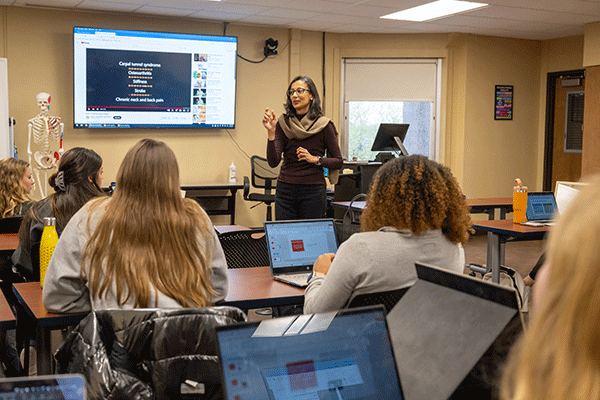
Pre-Occupational Therapy Program
Pre-Professional
-
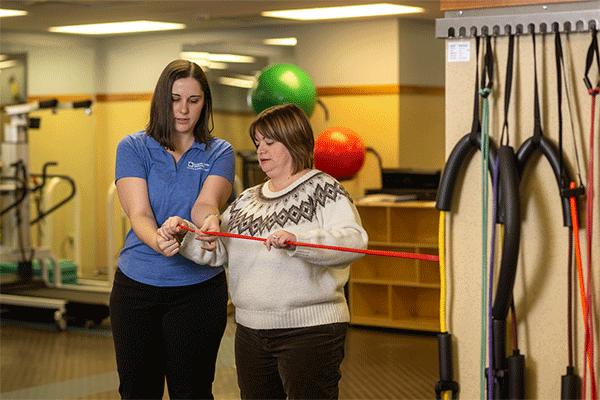
Physical Therapy (DPT)
Doctoral
